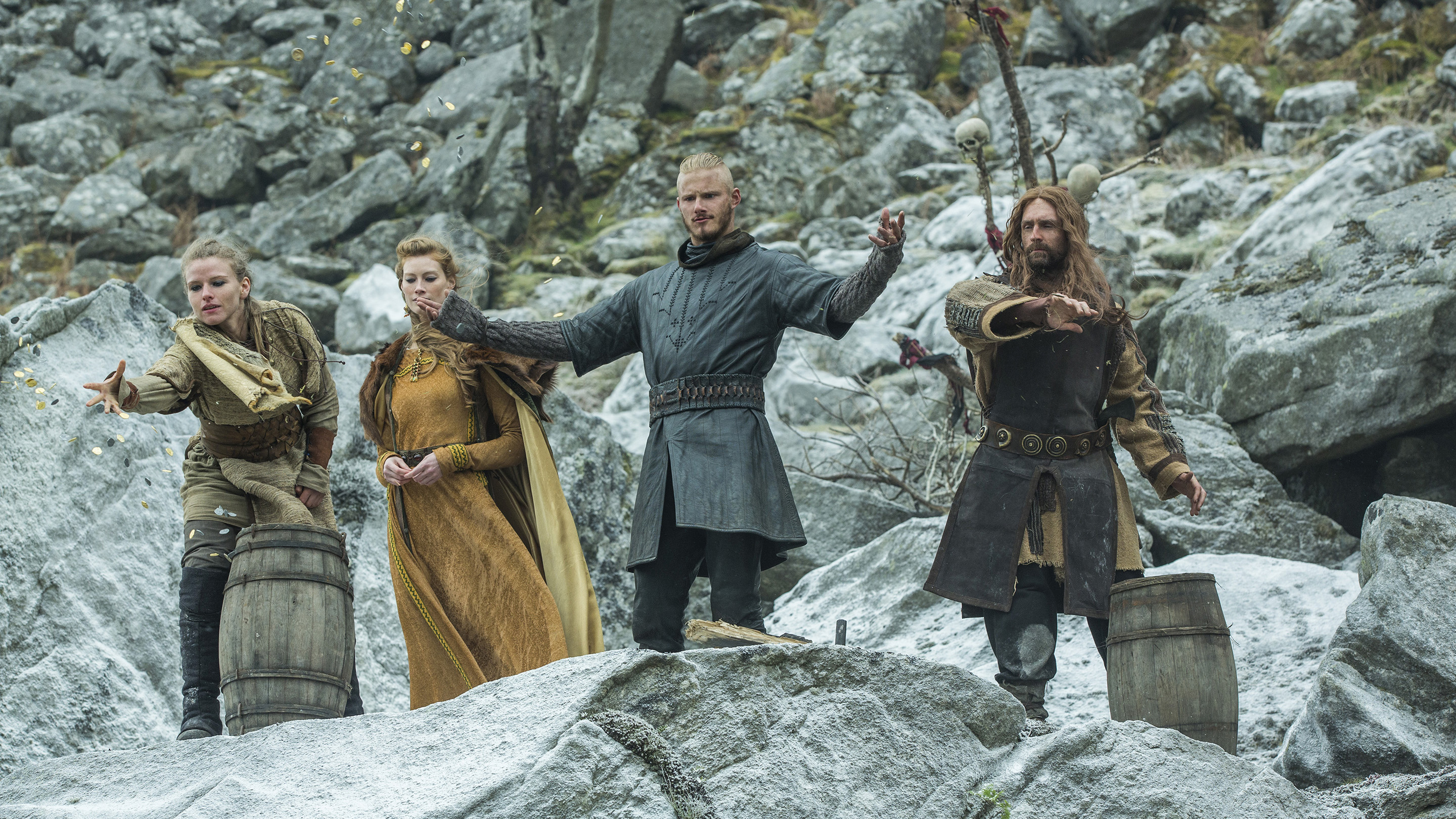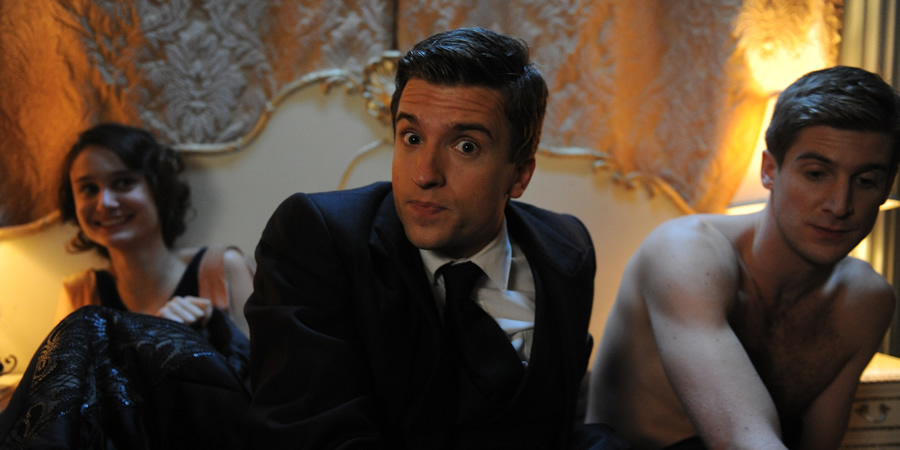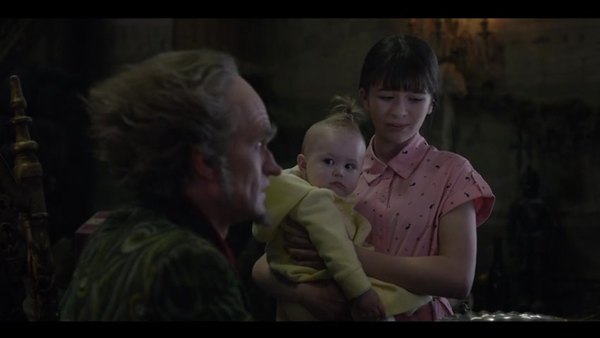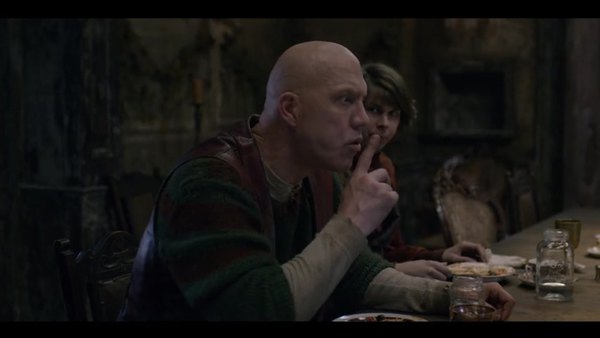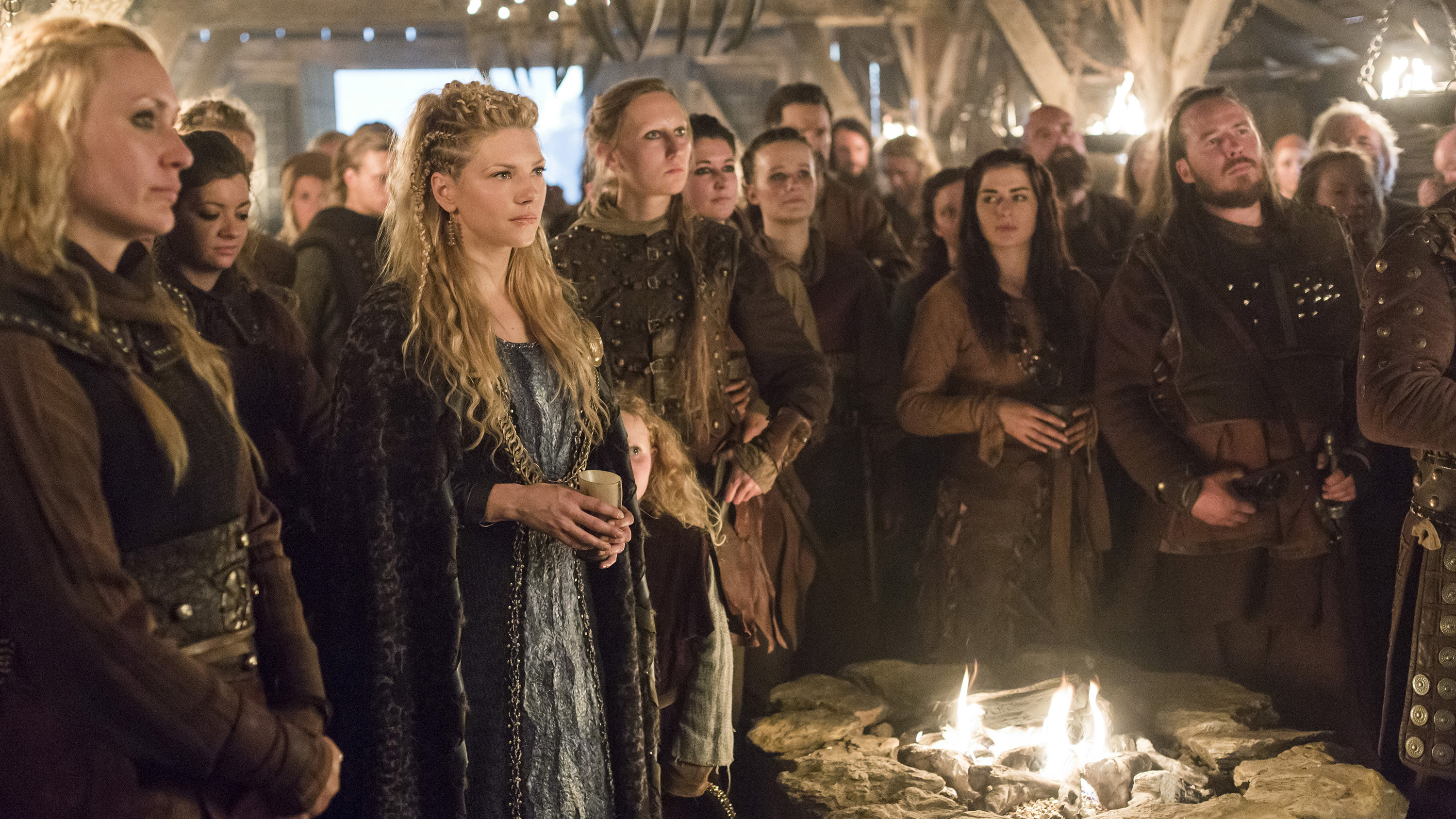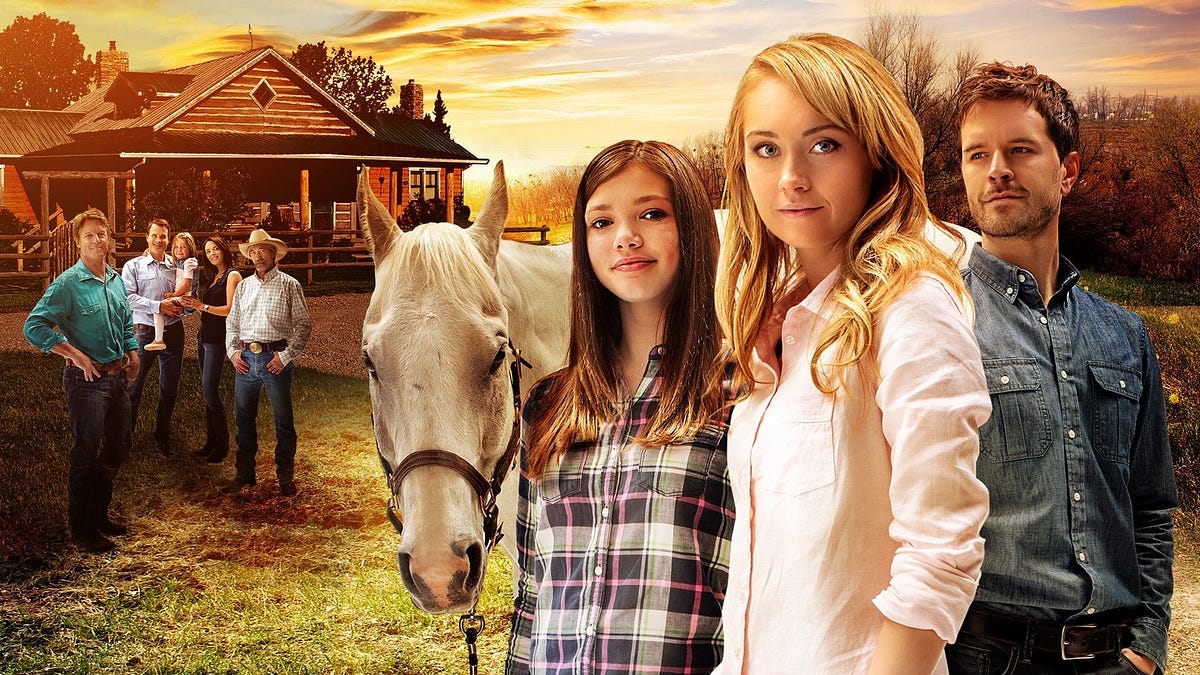"CNN" original series has once again done it as with this latest "History of the Sitcom" it's a historical and text book lesson a journey down TV's memory lane as it looks at landmark shows of the past and how they shaped culture and society. Any TV history or pop culture buff will love this series, as it looks thru the decades of the tube even as far back as black and white to see how times would change over the course. Interviews are given with series stars, TV network and series creators as they give their takes on how certain sitcoms changed America. Clips shown bring back memories of joy, comfort, and escape, as it's nice to see show origins along with it's growing pains. And each episode focuses on a different theme and genre that involved the overview of the sitcom from "Family", "Just Friends", "Sex", "Working for Laughs", "Race" and "Moving on Up", to being cast as "Outsiders". And with each episode the viewer sees how sitcoms and the theme changed with times and people.
Thru it all as one views each episode looking back you can again enjoy old laughs and old times while realizing that the history of sitcoms and the way they changed opened up people's minds for new thoughts. CNN Original Series is set to debut a new docuseries this July; History of the Sitcom premiering with back-to-back episodes on Sunday, July 11 at 9pm and 10 pm ET/PT. Following in the footsteps of the popular CNN Original Series examining The Movies and The Story of Late Night, History of the Sitcom reunites audiences with the television friends, families, and co-workers they grew up with while introducing cutting-edge comedies that are sure to be your next binge-watch. The scripts of comedies imitate real life and fulfill the audience's needs in everyday lives. That means people like to relax while watching other people's daily lives including love, friendship, or working life. They want to escape from the pressure they had during their own day and enjoy funny and easy-to-understand-shows.
Additionally, humor gives, as Bärmann claims, the audience a chance to breathe. With plotlines ranging from ludicrous to tragic, enchanting to infuriating, they represent a wide and diverse range of genres, including miniseries, animated series, comedies, dramas, season openers, series finales, foreign subtitled series, and everything in between. These unbelievable shows, beloved by both fans and critics, are what make watching television one of America's favorite pastimes. They feature epic battle sequences, technologically advanced shots, breathtaking locations, and some of the most remarkable and memorable moments ever seen on the small screen. THE MARY TYLER MOORE SHOW was also discussed in regards to Mary Richards's dating and sex life, despite not being tied to a man. In the final episode of the two-part season finale, House figures out what happened to Amber on the bus and why she is not responding to treatment.
Playing on a popular television death trope, everyone is torn up when a character dies, including the audience and House, even though no one was really crazy about said character. It is proof that an amazing and heart-wrenching death scene is worth its weight in television gold. There would be the nostalgic cast member insisting that nobody else on television was doing pure, honest comedy in those days, with a swipe at shows that distressed people by evoking real life. Some current celebrities or demi-celebrities would assert it was a profound influence on them, sounding like improvised eulogies for somebody they'd barely heard of.
And the where-are-they-now bit with former stars explaining how they turned their backs on big Hollywood movies to find themselves and/or rediscover their art in dinner theater. History of the Sitcom reunites audiences with the television friends, families, and co-workers they grew up with while introducing cutting-edge comedies that are sure to be your next binge-watch. As much as WandaVisionclearly has its roots in television, its more speculative elements also have roots in film. The Truman Show and Pleasantville both heavily influence WandaVision's set up and execution. In the second episode, Wanda's discovery of the technicolour drone in her distinctly black and white TV world is lifted straight from Pleasantville's iconic colour-contrasting aesthetic.
Even the way Wanda and Vision work to convince the people of Westview that they really belong there is reminiscent of the way the twins transported to TV Pleasantville must hold character at all costs. Since then, sitcoms have obviously had no problem writing real life actress's pregnancies into their characters' arcs. Occasionally though, shows will try to go the I Love Lucy season 1 route and white knuckle their way through an actress's pregnancy while maintaining that her character is not.
The "Hide Your Pregnancy" TV trope has turned up on series like 24, The Big Bang Theory, Friends, and more. Characters hiding an actress's pregnancy will often be depicted wearing loose, baggy clothing, or even having their stomachs positioned behind countertops, chairs, or other scenery censors. When January Jones was pregnant during season 5 of Mad Men, the writers decided to just give her character a food addiction and become overweight.
There is educational television, and there is "educational" television. There are facts to be found in these historically-set series, but they are fictionalized , and will obviously not be as true to life as a documentary. A show like The Great, for example, claims to only be "occasionally" true, but there is something about it that really seems to capture the spirit of the time.
And, once a particular time period has sparked your interest, there are certainly plenty of other sources to consult to get the real story. This docuseries reunites audiences with the television friends, families, and co-workers they grew up with while introducing cutting-edge comedies that are sure to be your next binge-watch. Featuring over 180 original interviews with sitcom icons the series breaks down how sitcoms have helped generations of Americans navigate an ever-shifting cultural landscape. Payne and Patrick McKay, The Lord of the Rings series is described as an "epic drama" set in the Second Age of Middle-earth — thousands of years before the events of the Lord of the Rings films and the novels by J.R.R. Tolkien on which they were based.
The series brings to screens for the very first time J.R.R. Tolkien's fabled Second Age of Middle-earth's history. Beginning in a time of relative peace, the series follows an ensemble cast of characters, both familiar and new, as they confront the long-feared re-emergence of evil to Middle-earth. But with growing income inequality and labor strikes back in the news again, it feels like the right time to revisit class.
Of course, '90s nostalgia may be enough for the "Roseanne" reboot to coast on, particularly for millennial audiences – but rumor has it that this season will also feature both gender fluid characters and Trump supporters. The same question that plagued "All in the Family" will likely be posed again; who will viewers identify with, and who will they laugh at? Class politics on sitcoms has always been more complicated than we give the genre credit for.
In a sense, Fred was the black equivalent to Archie, and the show was another take on the decade's cultural generation gap. "Good Times" featured a hardworking black family living in the inner-city projects of Chicago, and addressed realistic problems like eviction, street gangs, racial bias and an inadequate public school system. Several black activists faulted "Good Times" for relying on harmful stereotypes and buffoonery.
Lear said recently on a podcast that members of the Black Panther Party specifically challenged him to expand the range of black characters on his shows. But others appreciated the show for portraying an intact black nuclear family - something the actors had insisted upon during the production process. Together, these programs sparked debate about what types of television images were best for the African-American community. This may have ultimately led to the slew of sitcoms about well-to-do black families, like "The Jeffersons," and later, "The Cosby Show," and "The Fresh Prince of Bel-Air," which some critics believed offered more uplifting representations of African Americans.
Ultimately, it's easy to look at WandaVision's reveal as to why the series drew on so many sitcoms as somewhat cynical, as a story hammering home episode after episode that the escapism television offers us is shallow at best and actively harmful at worst. It's true that WandaVision as a show is about one woman coping with her grief by immersing herself body and soul in a sitcom-soaked reality of her own creation shows the audience the harm we cause ourselves and others when we deny the truth of our reality. This episode of WandaVision's main plot point was Wanda losing control of reality, struggling to maintain the facade of control for her family, and so she finally decides to open up and overshare about it.
The creators of WandaVision chose the most uncomfortably intimate style of sitcom to realise her fall from grace in yet another series of uncannily suitable homages to an era of television that provides exactly what Wanda needs. The shows on this list, from I Love Lucy to Curb Your Enthusiasm (still in production!), all defined, redefined, revolutionized and maybe even transcended the art of the sitcom. Now, in the age of streaming, you don't have to spin the TV dial and hope to catch something in syndication late at night. These series are available online to stream whenever you want — a treasure trove if ever there was one.
The premiere episode at 9pm ET/PT titled "American Family" will examine how sitcoms have evolved to reflect the changing face of American families. The following episode at 10pm ET/PT titled "Sexual Revolution" will explore the revolution of sex in sitcoms, including the integration LGBTQ+ storylines in representing a more modern world. This episode has not only been called the best episode in the "Game of Thrones" series but also one of the best television episodes of all time, which explains its near-perfect rating on IMDb.
Two major action sequences take place in the next-to-last episode of season six, one of them featuring Daenerys going after her enemies. This series finale made it on several best television series finale lists, including those of USA Today, Entertainment Weekly, and Variety. The Fisher clan's story is tied up not only in the present but in the future, using a flash-forward technique in an extended, seven-minute montage that reveals the death of all the show's main characters. Given that every show opened with death, it seemed a fitting end that it should close with it. The office prepares to say goodbye to Michael in this emotional episode. This was the last time Steve Carell would appear on the show, with the exception of his return for the series finale two years later.
The final scene Carrell shot was the one where Michael says goodbye to Jim. The final episode of the first season of the HBO sci-fi western thriller received positive reviews from critics and fans alike. At 90 minutes, the episode was two minutes longer than the 1973 Michael Crichton movie on which the series is based.
Maeve, Dolores, and Foster experience major shifts in this episode, setting the stage for season two. When the apocalypse looms, the Winchester brothers realize they need to make some important and difficult decisions. This season finale was originally intended to be the series finale, as the show's creator only imagined five seasons. Much to the delight of fans, its showrunner Sera Gamble took over to continue the series.
We also now have a "must see" list of comedy sketches, shows and movies to watch. Highly recommend but not for younger kids as there is a lot of swearing and some adult content. If someone really wanted to do a series like this right, they would have hired TV writers, both drama and comedy, the kinds of writers that you KNOW would do a great job putting together the history and taking the time to mention some smaller shows that were truly brilliant but short-lived. They'd have also asked questions of the actors from a much smarter point of view and would have drawn out truly funny and interesting stories that have not been heard before.
The network is known for creating immensely entertaining pop culture documentaries — The History of Comedy, The Movies, and The 2000s are all currently streaming on HBO Max — and their newest offering might just be their best yet. Airing Sunday nights on CNN, History of the Sitcom is eight episodes of pure pop culture nostalgia. An informative stroll down memory lane, the gripping docuseries explores how sitcoms continuously help to shape our ever-evolving cultural landscape. Featuring interviews with over 180 sitcom icons, the first three episodes are now available to stream on CNNgo. Since America has long found it easier to laugh about sex than talk seriously about it, sitcom humor has had a critical role ushering in a new era of openness, not just towards sex, but toward women's rights and gender identity. No sitcom finds more endlessly inventive humor in implicit class tensions than Frasier, as a working-class father tries to get along with his sublimely high-brow sons.
But though the American Dream of social mobility underpins America's social contract, that dream is so often beyond reach that it takes sitcom humor to help laugh at the struggles of getting ahead. The Honeymooners, The Beverly Hillbillies, The Andy Griffith Show, Good Times, Alice and Roseanne all offer funny snapshots at class divisions in America, divisions that are even starker in Arrested Development and Schitt's Creek. But It's Always Sunny in Philadelphia that asks the hardest, perhaps funniest question of all - is this aspirational game we're all playing really rigged against us?
Featuring sitcoms such as The Honeymooners, The Beverly Hillbillies, The Andy Griffith Show, Good Time, Alice, Roseanne, Arrested Development, Schitt's Creek, and It's Always Sunny in Philadelphia. Later this month, the beloved 1990s family sitcom "Roseanne" returns to ABC. But One Day at a Time's revival isn't merely about its central family; it is, just as much, about the world its members occupy. The new series goes out of its way to suggest that the Alvarezes are representative of many of the social trends that define life in the America of 2017.
Penelope herself is a single mom and an Army veteran; she is also a physician's assistant who struggles with PTSD and depression. An early episode of One Day at a Time finds her realizing that her colleague, a male nurse—who does the same job she does—earns more money than she does, while she supports her family, and he supports only himself. Yes, the remake of Norman Lear's classic '70s sitcom that premiered this month, with a full 13-episode season, on Netflix. The show that centers, this time around, on the Alvarezes, a Cuban-American family, headed by a single mother , living in Los Angeles. The show that is, both as entertainment and as cultural commentary, exceptionally good. The moment of Westview's transformation is arguably where this episode of WandaVision draws its final sitcom reference.
In an awesome display of grief and power, Wanda creates a power surge that builds the post-War suburbia we glimpsed in WandaVision's first episode, including Wanda and Vision's own home. The style of how Wanda's magic shapes the home, whether intentionally or otherwise, calls back to a season 5 episode of Charmed called 'House Call' in which an eerily similar visual effect is used to create a hidden haunted manor out of thin air. The prioritising relatability in these sitcoms is generally considered to have spilled over into sitcoms to compete with the ratings reign of reality television by imitating reality TV in a fictional setting. The documentary style of reality TV, while also appealing due to its relatively low budget necessities, also permitted the intimacy of feeling like characters that you loved were real and allowing you into their lives to see they were just like you. Randall Park, who plays Agent Jimmy Woo, spent many years playing loveable Taiwanese-American dad, Louis Huang in the family sitcom, Fresh Off The Boat, teasing the possibility of the series referencing that now he's been sucked into Wanda's sitcom fantasy.
Also, now Kat Denning's Darcy Lewis has been sucked into Wanda's sitcom hex too, we may even see her reprise her role as Max from 2 Broke Girls, leaning into the workspace sitcoms of the 2010s like 2 Broke Girls, Parks and Rec, and Brooklyn-99. Malcolm In The Middle was a distinctively '90s to early '00s family sitcom, leaving us with the late '00s and '10s sitcoms left for Wanda to throw herself, her family and us into. It's anyone's guess where the series might go, but I'm guessing we have some Modern Family mockumentary-style WandaVision still in store for us.
Finally, we have the 'brother/in-law comes to town' trope, a staple of the family sitcom for a long time. Come to town unexpectedly, create tension with the brother-in-law, stir up trouble with the rugrats, and ultimately give you grief. " In sitcoms, a sibling coming to visit is a popular way to shift up dynamics and create tension by introducing a fresh character, which Pietro undoubtedly does. Phyllis is the nexus of everything happening in Mrs. America, but each episode also spends time with one or two other important women on the opposite side of the movement, from Gloria Steinem to Betty Friedan to the first black woman to run for President, Shirley Chisholm .
Where the limited series, created by Dahvi Waller, really excels is that it's not overly reverential to these real-life characters. It also, crucially, doesn't treat them as caricatures—there is a deep, recognizable, and very true humanity to each of these women that is immediately authentic, as they move in and out of each other's lives. But it informs everything about the 1930s along the way as a labyrinthine but deeply human exploration of a key era of German history. With the rise of Stalin impacting Europe, and the Treaty of Versailles not sitting well with dangerous nationalist groups, Berlin is a hotbed of covert activities. And the payoff, after the show's marvelous first two seasons, culminates in one of television's best episodes of all time . The group is uninterested in participating, but Jeff is adamant that they all take this class together.
He explains that he took online courses during the summer and is only one history credit away from graduating. The group is shocked that he is graduating early, particularly Annie, who is disappointed by Jeff's selfishness. Jeff declares that he will win seven red balls, so they can all take the history class. An angry Annie leaves with Shirley to pull some senior pranks while Abed and Pierce decide to stay behind and watch.
Abed tells Troy to go ahead to the fountain with Britta and do the traditional wishes without him. The competition starts, and Jeff manages to bully his way through Leonard and Annie Kim to climb up a pyramid and claim his first red ball. The series finale set a ratings record with a 72 percent share, and went down as history-making for the way it gave audiences a climax to all the tension it had built up over four seasons. This season six finale features an unbelievable, extended vengeance sequence and a major revelation about an important character.


